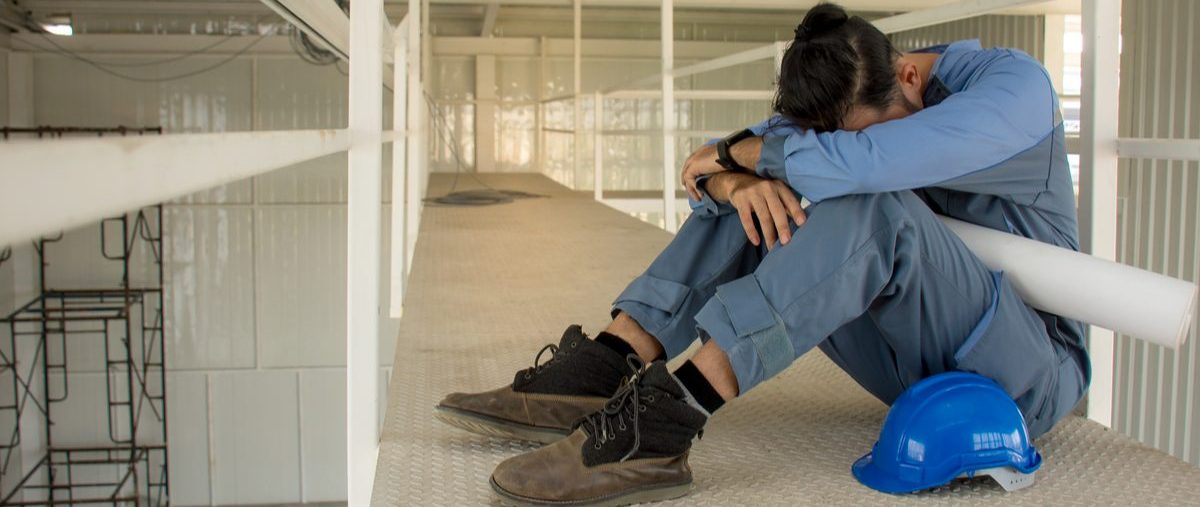Mental Health Initiatives for Construction Professionals
One in five Americans struggles with a mental health condition. Society has created a schema of those at risk for psychiatric disorders— women, teenagers, abuse victims and so on. It's not unusual for this schema to give less regard to men — even with changing mental health initiatives — because many people assume men are stronger and less vulnerable to mental health struggles.
This mindset has created several pockets of society where men either deem mental health issues unimportant or avoid seeking help out of fear. The construction industry is one of these pockets. While professionals are doing great work to increase physical safety on the jobsite, mental health concerns too often stay on the back burner.
What can the construction industry do to change attitudes about mental health? This male-dominated sector sees endless amounts of silent suffering due to preconceived notions, but some employers are fighting back against the stigma. Every construction business can do the same by educating their employees and revising company policies.
The Reality of Mental Health Concerns
A Centers for Disease Control and Prevention (CDC) report across 17 states found the construction and extraction occupational group had the highest male suicide rate in 2012 and 2015. Men in positions that are both high skill and high-risk, such as site managers, are 1.5 times more likely to die from suicide. On the opposite end, low-ranking, uneducated workers are also at high risk for mental health issues and self-harm. From higher-ups to entry-level workers, the construction industry paints a grim picture concerning mental health.
Construction workers contend with long hours and exhaustion on top of seasonal employment schedules. Many of them don't have anything higher than a high school education, which can make finding work in the interim difficult. Lengthy bouts of unemployment can damage self-esteem, cause discouragement, and lead to both physical and mental health issues. Considering how many male construction workers pride themselves on their masculinity and endurance, falling to a vulnerable state can be a tough blow.
Workplace culture complicates an already precarious situation, with many environments facilitating substance abuse and employee harassment. Those struggling may receive condemnation from their peers, which can push them to self-medicate instead of seeking a medical professional.
Increased Safety Measures
One of the first goals employers should aim for is implementing better safety strategies. Physical injuries don't only hurt the flesh—they can damage the psyche as well. Chronic pain and depression have high comorbidity rates, with 85% of chronic pain sufferers also experiencing severe depression. The onset of depression ties back into the sense of resilience many men carry. When manual laborers land in a position where they can't work up to par, they might beat themselves up about it and feel like they've failed.
Increased safety measures protect against physical and mental damage, and they make for a better atmosphere within the worksite. Few people desire to go to a job where they feel directly endangered every day. The construction industry has a higher rate of fatal injuries than most other sectors, but individual employers can lower these statistics by implementing better safety protocols.
Employers must train workers on safe driving techniques, loading and unloading, equipment maintenance and personal protective equipment. A poll found that 25% of workers didn't receive any training regarding protective gear such as hard hats, goggles and face masks. This training negligence would have detrimental effects within any workplace—construction is no exception.
Open Communication of Mental Health Concerns
Employers should encourage open communication about mental health concerns among workers. Employees need safe and productive environments where they can share their struggles without facing criticism or discouragement. Psychological screenings should be a readily accessible service for those seeking a diagnosis.
The Construction Industry Blueprint provides a guide for managers and employers on how to talk to their workers who might be at risk for suicide. The blueprint includes scripts for starting fruitful discussions and giving presentations on the importance of mental health. It also provides checklists for employers to measure the quality of their company's mental health initiatives and make improvements where needed.
Some workers may choose to enroll in therapy. In this case, employers need to provide flexible scheduling for workers to attend appointments during workdays. Many therapist offices close at or before regular nine to five working hours, which can make starting therapy a challenge for those with rigid schedules. Employee assistance programs with on-site counselors and therapists can serve as a convenient alternative.
Using Technology to Set Limits
Most people recognize when their body is at its physical limits, but realizing it within the mind can be more challenging. Many people either disregard mental distress or acknowledge its existence but push through it anyway. The concept of resilience—although helpful at its core—has led some to think that mental toughness means ignoring bodily signals.
That's why some construction companies have integrated activity trackers to help employees monitor their physical responses while working. These trackers allow workers to address physical issues they didn't recognize before. This technology has resulted in employees eating better, taking more breaks and practicing calming breathing exercises between tasks.
By monitoring their stress, heart rate and blood oxygen levels, workers can gain insight into how their jobs affect their well-being. They can make healthier decisions regarding workloads and pacing and request more flexible schedules. More construction companies can benefit from supplying their workers with the necessary energy-tracking tools for analyzing data and setting personal limits.
Safeguarding Mental Health in the Construction Industry
Comprehensive mental health care has a long way to go across many industries, but construction companies are actively making improvements to keep their workers safe. Earning a living is paramount for survival, but it shouldn't come at the cost of anyone's wellness. Thankfully, more people are recognizing this fact and making the appropriate changes.
 Holly Welles is a freelance writer who covers construction and real estate innovations for publishers across the web, including NCCER and Constructible. She also runs her own residential real estate blog, The Estate Update.
Holly Welles is a freelance writer who covers construction and real estate innovations for publishers across the web, including NCCER and Constructible. She also runs her own residential real estate blog, The Estate Update.
